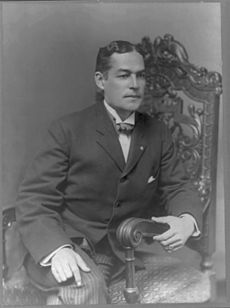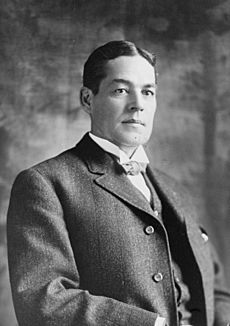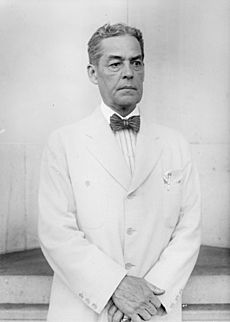Robert Latham Owen facts for kids
Quick facts for kids
Robert Latham Owen
|
|
|---|---|
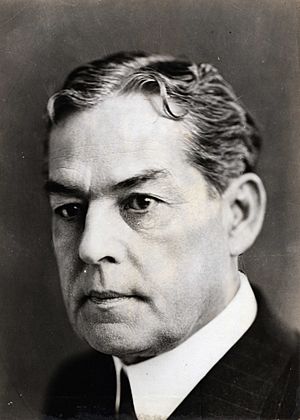
Owen in 1922
|
|
| Secretary of the Senate Democratic Caucus | |
| In office December 3, 1907 – March 4, 1911 |
|
| Leader | Charles Allen Culberson Hernando Money |
| Preceded by | Edward W. Carmack |
| Succeeded by | William E. Chilton |
| United States Senator from Oklahoma |
|
| In office December 11, 1907 – March 4, 1925 |
|
| Preceded by | Seat established |
| Succeeded by | William B. Pine |
| Personal details | |
| Born | February 2, 1856 Lynchburg, Virginia, U.S. |
| Died | July 19, 1947 (aged 91) Washington, D.C., U.S. |
| Political party | Democratic |
| Education | Washington and Lee University (BA) |
Robert Latham Owen Jr. (February 2, 1856 – July 19, 1947) was one of the first two U.S. senators from Oklahoma. He served in the Senate from 1907 to 1925.
Robert Owen was born into a wealthy family in Lynchburg, Virginia. His father was a railroad president. However, his family lost all their money when he was a teenager. His father also passed away around that time.
Owen, who was part-Cherokee through his mother, moved west to Indian Territory. There, he started a new life. He worked as a schoolteacher for Cherokee orphans. He also became a lawyer, a writer, and a federal agent for Native American affairs. Later, he founded and led a bank. One of his big achievements was winning a court case in 1906. He helped the Eastern Cherokees get money from the U.S. Government. This was for lands they had lost long ago. These successes helped him get elected to the U.S. Senate in 1907. This was when Oklahoma became a state.
As a Democrat, Owen supported many progressive ideas. These included making government more controlled by the public. He also fought against child labor. He is best known for helping create the Federal Reserve Act of 1913. This law set up the Federal Reserve System, which is like the central bank of the U.S. He wanted to make sure banks didn't have too much power over it. Later, he felt the Federal Reserve made mistakes that led to the Great Depression. In 1920, he tried to become president but was not chosen.
Contents
Early Life and Family
Robert Owen was born in Lynchburg, Virginia, on February 2, 1856. He was the younger of two sons. His father, Robert L. Owen Sr., was a civil engineer and railroad president. His mother was Narcissa Chisholm Owen. The family went to an Episcopal Church.
Owen's family came from Wales. Many of his relatives were doctors and teachers. His grandfather and uncle were doctors in Lynchburg. His uncle even managed many hospitals during the Civil War. His father served in the Virginia State Senate after the war.
When Owen was a boy, his family lived in a famous house called Point of Honor. He went to private schools in Lynchburg and Baltimore.
The American Civil War badly damaged Virginia's railroads. In 1867, Owen's father quit his job as railroad president. He disagreed with a plan to combine several railroads.
In 1873, when Owen was 16, his father died. The family had lost all their money. This was due to a financial crisis called the Panic of 1873. Owen later wrote that his mother, who had lived a life of luxury, had to teach music to earn money. Owen was able to go to Washington and Lee University with scholarships. He graduated in 1877 as the top student. He also won a gold medal for debating. His older brother, William, became a doctor in the U.S. Army.
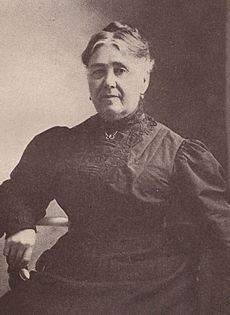
Owen's mother, Narcissa Chisholm Owen (1831–1911), was part Cherokee. She helped her son's career and was also a talented painter. In 1907, she wrote a book about her life. It described living between Cherokee and American cultures. Her book has been studied by scholars. Robert Owen was listed as 1/16 Cherokee by blood. His mother had been raised among Cherokees. She used her heritage to help her sons. She even gave Robert an Indian name, Oconostota, after a famous Cherokee chief.
Starting a Career in Oklahoma
In 1879, Owen moved to Salina in Indian Territory (now Salina, Oklahoma). This was on the advice of a family friend, Col. William Penn Adair, a Cherokee leader. Owen was accepted as a member of the Cherokee Nation. From 1879 to 1880, he was the main teacher at the Cherokee Orphan Asylum. His mother joined him in 1880 and taught music at the Cherokee Female Seminary.
Owen studied law and became a lawyer in 1880. From 1881 to 1884, he worked to improve the Cherokee school system. He also served as president of the International Fair in Muscogee, which is now Muskogee, Oklahoma. In 1884, he owned and edited a newspaper called the "Indian Chieftain."
In 1885, Owen became the federal Indian agent for the Five Civilized Tribes. This was a very important job in Indian Territory. He helped settle many legal cases between 1885 and 1889. He also helped set up the first U.S. Court in Indian Territory. His mother was his hostess until he married Daisy Deane Hester in 1889. They had one daughter, Dorothea.
After leaving government work in 1889, Owen started the First National Bank of Muskogee in 1890. He was its president for ten years. He later wrote that the bank almost failed during the Panic of 1893. This experience made him realize that the U.S. banking system needed big changes.
Owen also worked as a lawyer on important cases about Native American land. In 1900, he took on a famous case for the Eastern Cherokees. They wanted money from the U.S. Government for lands they had lost. In 1906, Owen won the case. The Cherokees received nearly $5 million. He also won important cases for the Western Cherokees, Choctaws, and Chickasaws.
Owen was a tall man who always looked sharp. A newspaper once said he looked "like a leading man in a society drama." The New York Times described him as "the square-jawed, black eyed, lithe young man from the West." They also noted his voice, which could be soft or harsh depending on his mood.
By the time he started his political career, Owen was a wealthy man. He had earned money from his law practice, land deals, ranching, mining, and oil investments.
Political Career
Owen was part of the Democratic National Committee from 1892 to 1896. He helped pass a law in 1901 that gave citizenship to people living in Indian Territory. He also played a key role in the Sequoyah Constitutional Convention in 1905. This group wanted Indian Territory to become a state called Sequoyah. However, President Theodore Roosevelt and Congress opposed this. So, Indian Territory was combined with Oklahoma Territory to form the state of Oklahoma in 1907.
Owen worked to give people more control over their government. He supported Prohibition (banning alcohol). He also campaigned for women's right to vote. He helped put direct primary elections, initiatives, referendums, and recalls into Oklahoma's state constitution. These measures allow citizens to have a more direct say in laws and elections. He often spoke out against corruption in politics. He helped start the National Popular Government League and was its president from 1913 to 1928.
When Oklahoma became a state in 1907, Democrats gained power. They used public anger against large companies to win elections. Oklahoma became a Democratic state for many years.
Owen ran for U.S. Senator. Democrats in Indian Territory called him a "statesman, lawyer, businessman," and importantly, "an Indian." He won the primary election. Then, the state legislature officially elected him to the United States Senate. Owen and Thomas Gore were the first two senators from Oklahoma. They drew lots to see who would serve the longer term. Owen won and served a term of over five years. He was elected Secretary of the Senate Democratic Caucus in December 1913.
Owen was re-elected in 1912 and 1918. He served from December 11, 1907, to March 4, 1925. He reportedly had a mailing list of 300,000 names.
As a new senator, Owen actively supported William Jennings Bryan in the 1908 presidential election. They remained political friends for many years.
When Owen joined the Senate, he was the second senator with known Native American ancestry. The other was Republican Senator Charles Curtis of Kansas. Curtis was part Kaw, Osage, and Pottawatomie. Curtis had written the Curtis Act of 1898. This law broke up tribal governments and divided communal tribal lands into individual plots. The goal was to help Native Americans fit into mainstream U.S. society.
Soon after Owen was elected, his mother published her memoirs. She wrote about her life as a part-Cherokee woman. Her book has been re-published and studied by scholars.
Banking and the Federal Reserve
Owen joined the Senate when people were worried about the U.S. financial system. There had been a financial crisis in 1907. Without a central bank, a wealthy banker named J. P. Morgan had to step in to save the banking system. Owen had been interested in banking since his time at the First National Bank of Muscogee. In 1898, he traveled to Europe to study how central banks worked. He even met with officials at the Bank of England.
In the Senate, Owen gave a strong first speech about banking issues. He criticized the power of large banks. He proposed several financial reforms. He tried to create a system to insure bank deposits, like some states had. However, federal deposit insurance was not adopted until 1933.
In 1912, Democrats gained control of the White House and the Senate. Owen successfully pushed for a new United States Senate Committee on Banking and Currency. He became its first chairman, a role he held from 1913 to 1919. In this position, he worked with President Woodrow Wilson to create the Federal Reserve Act of 1913. This law is also known as the Glass-Owen Act.
Many people believed the U.S. needed a central bank. This bank would act as a "lender of last resort" during financial crises. It would also help manage the money supply. The U.S. economy relied heavily on farming. The money supply needed to be flexible to handle the demand for credit during harvest times. However, many Americans were afraid of a powerful central bank.
Debates focused on who would control the Federal Reserve. Owen and other progressives opposed a plan that would give control to large banks. Owen argued that banking should be a public service, not controlled by private interests.
President Wilson met with people who had different ideas for the Federal Reserve.
- Rep. Carter Glass wanted a system controlled by private banks.
- Treasury Secretary William Gibbs McAdoo wanted a central bank controlled by the government.
- Owen's idea was a middle ground. It included a national board appointed by the government and regional banks. Owen's plan was closest to what President Wilson sent to Congress.
During the debates, Owen's committee had trouble agreeing. President Wilson had to step in. He told Senate Democrats to support Owen's bill. On December 19, 1913, the Senate passed Owen's bill.
The Federal Reserve Act became law on December 23, 1913. It was closer to Owen's plan. It gave the government more say in appointing members to the central Federal Reserve Board. But bankers in each region would run the twelve regional Federal Reserve Banks.
The Federal Reserve started as a mix of public and private control. It was meant to be independent of politics. Each of the twelve regional banks made its own policy decisions.
After World War I, there were disagreements about the Federal Reserve's goals. Owen believed the Fed should keep prices stable and interest rates moderate. Other early Fed leaders focused on maintaining the gold standard and the strength of the banking system.
Owen became critical of the Federal Reserve's policies in the early 1920s and 1930s. He felt they caused prices to fall too much. He said he tried to include a rule in the bill to keep prices stable. But this rule was removed. He believed the largest banks had too much influence. He also thought the Fed's actions caused the Great Depression. At the time, this was not a popular idea. But in recent years, many economists, like Milton Friedman, have agreed with Owen.
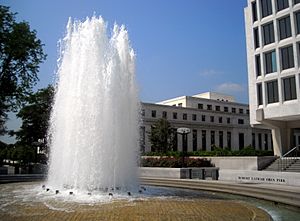
Besides the Federal Reserve Act, Owen also helped pass the Federal Farm Loan Act of 1916. This law helped small farmers get loans through co-operatives.
Robert Latham Owen Park, located at the Federal Reserve in Washington, D.C., honors Owen's role in creating the Federal Reserve.
Other Important Work
Owen is mostly remembered for his work on the Federal Reserve. But he also worked on many other issues. Many of these were part of the Progressive Movement.
In 1908, he helped pass a law that removed limits on selling individual plots of Native American land in Oklahoma. This continued a process of changing Native American lands from group ownership to individual ownership. Some people criticized these policies. They argued that tribal structures were harmed and that Native Americans were tricked into selling their land cheaply. Owen argued that the old rules were unfair and stopped economic growth.
Owen supported lowering tariffs (taxes on imported goods). But he made an exception for the oil industry. He said small oil producers in Oklahoma needed protection from large companies like Standard Oil. Owen opposed many large companies he called "trusts." He tried to strengthen the Sherman Antitrust Act, which breaks up monopolies. He also tried to make sure companies had to report their campaign donations. He supported the Sixteenth Amendment, which allowed the government to collect income tax. This tax was needed because tariffs were being lowered.
In the Senate, Owen continued to push for more public control of government. He repeatedly tried to pass a constitutional amendment for the direct election of U.S. Senators. Before 1913, state legislatures chose senators. His efforts led to the Seventeenth Amendment in 1911. He also strongly supported women's right to vote. This led to the Nineteenth Amendment in 1919. He also tried, but failed, to get the initiative and referendum adopted at the federal level.
In 1911, Republicans were blocking Arizona from becoming a state. They said Arizona's constitution had too much public control, like the initiative and recall. Owen spoke for twelve hours in the Senate to force a vote on admitting both Arizona and New Mexico as states. During his long speech, he was told that President William Howard Taft wanted to talk. Owen famously replied, "Present my compliments to the President, and advise him that at present I am engaged in addressing the Presidents of the United States."
From 1910 on, Owen tried to create a cabinet-level Department of Health in the federal government. He also tried to create a Department of Education starting in 1917. These efforts did not succeed during his lifetime. A combined Department of Health, Education and Welfare was finally added to the cabinet in 1953.
Owen was very active in efforts to outlaw child labor. He helped write the Keating–Owen Act of 1916. This law aimed to stop the sale of goods made with child labor. However, the Supreme Court ruled it unconstitutional in 1918. Congress tried other ways to regulate child labor, but they were also struck down. Finally, in 1941, after Owen retired, the Supreme Court changed its mind. It ruled that Congress could regulate working conditions, including child labor.
Owen was a strong supporter of President Woodrow Wilson during World War I. After the war, Owen worked to get the U.S. to join the League of Nations. He tried to find a compromise between different political groups. However, his efforts failed.
Owen was also concerned about the world economy after the war. He tried to promote international trade and credit for European countries.
Presidential Campaign and Later Years
Owen ran for president in 1919 and traveled to several states in 1920. He published books about his work on the Federal Reserve and his economic ideas. His friend William Jennings Bryan supported him, but Bryan's influence was fading. Owen did not get much support from others.
At the 1920 Democratic National Convention, Owen received some votes, mostly from Oklahoma and Nebraska. He eventually released his delegates to support James M. Cox, who became the Democratic nominee. Cox and his running mate, Franklin D. Roosevelt, lost the election.
After the war, Owen's views on international affairs changed. In 1923, he began to believe that France and Russia were more responsible for World War I than Germany. He hoped this new view would help Germany and France reconcile. He tried to get the Senate to investigate the war's causes, but he failed. In 1926, after leaving the Senate, he published a book about his ideas.
Owen wrote that the German people did not want the war. He believed it was forced on them by Russian leaders. He felt that "The happiness and future peace of the world require the reconciliation of the German and French people."
Some people thought Owen's focus on war guilt showed he was losing touch with current U.S. politics. After 1920, U.S. policy shifted towards isolationism, which went against Owen's beliefs.
In February 1924, Owen announced he would not run for re-election. On March 4, 1925, at age 69, he retired from the Senate.
Later Life and Death
After Owen retired, the Democratic Party lost his Senate seat. This was partly due to a split in the party over the candidate Jack C. Walton. Walton had been removed from his position as governor. Many Democrats, including Owen, did not support him. The seat was won by a Republican. The seat returned to Democratic control in 1930.
After leaving the Senate, Owen practiced law and worked as a lobbyist in Washington, D.C.. In 1923, he formally adopted his only grandchild, who was named Robert Latham Owen III. In the 1928 Presidential election, Owen could not support the Democratic candidate, Al Smith, because of Smith's views on Prohibition. Owen supported Republican Herbert Hoover, which he later regretted. In 1932, he returned to the Democratic Party and strongly supported Franklin D. Roosevelt.
In retirement, Owen worked on creating a universal alphabet based on sounds. He was inducted into the Oklahoma Hall of Fame in 1941. In his later years, Owen was almost blind. His wife passed away in 1946. He died in Washington on July 19, 1947, after prostate surgery. He was buried in Spring Hill Cemetery in Lynchburg, Virginia, near his mother. Carter Glass, who co-sponsored the Federal Reserve Act with Owen, is buried nearby.
Works
This list includes books written by Robert Latham Owen:
- The Code of the Peoples' Rule: Compilation of Various Statutes, Etc. Relating to the People's Rule System of Government. Washington DC, Government Printing Office, 1910.
- The Covenant of the League of Nations: What It Proposes and What It Does Not Propose. Washington DC, Government Printing Office, 1919.
- The Federal Reserve Act. New York, The Century Co., 1919.
- Foreign Exchange. New York, The Century Co., 1919.
- "Foreword" (dated October 29, 1934) to Money Creators by Gertrude M. Coogan, Chicago, Sound Money Press, 1935.
- The Russian Imperial Conspiracy, 1892–1914: The Most Gigantic Intrigue of all Time. First edition, 1926, privately printed. Second edition, 1927, published by Albert and Charles Boni, New York.
- Where Is God in the European War? New York, The Century Co., 1919.
- Yellow Fever; a Compilation of Various Publications: Results of the Work of Maj. Walter Reed, Medical Corps, United States Army, and the Yellow Fever Commission. Washington DC, Government Printing Office, 1911.
You can hear a recording of Owen giving a speech from 1920 on the Library of Congress website. His papers are kept at the Library of Congress. Smaller collections are at the University of Oklahoma's Carl Albert Center and the Federal Reserve.
 | Kyle Baker |
 | Joseph Yoakum |
 | Laura Wheeler Waring |
 | Henry Ossawa Tanner |


